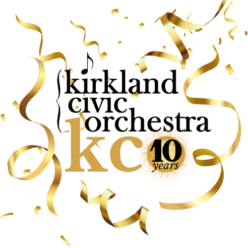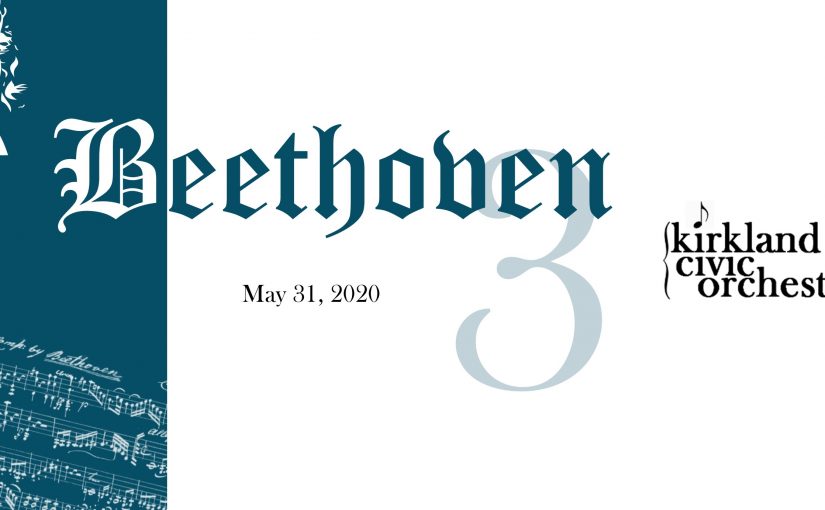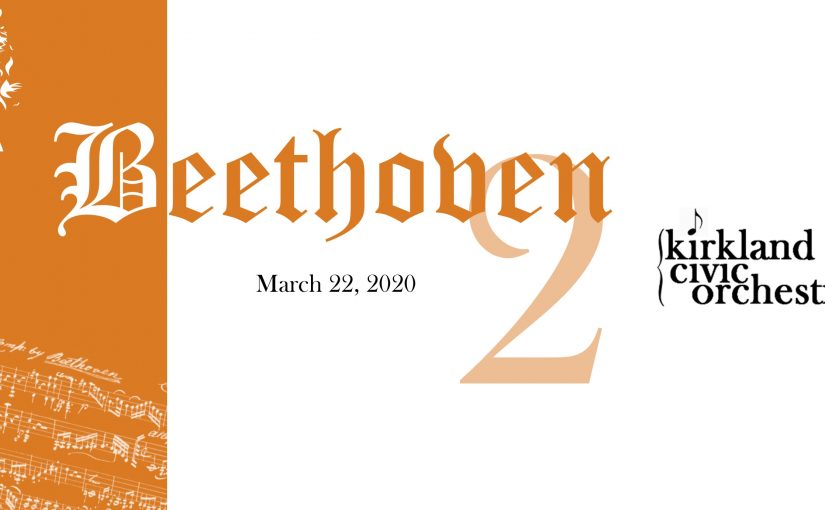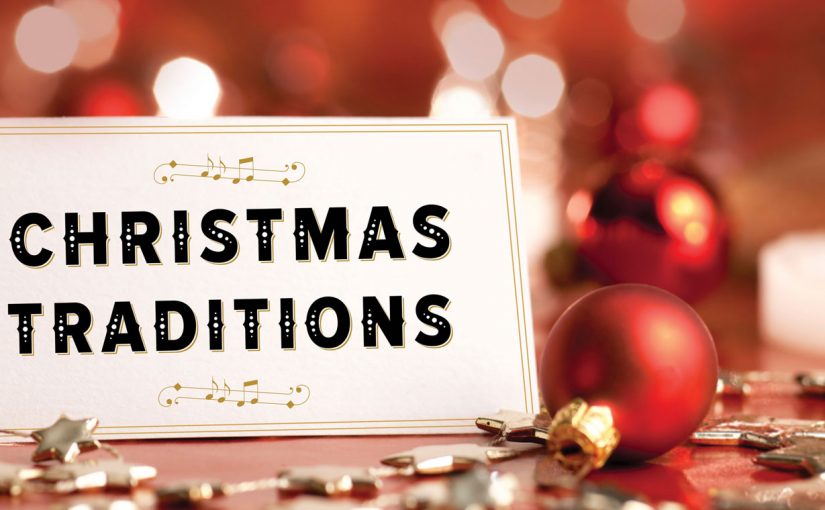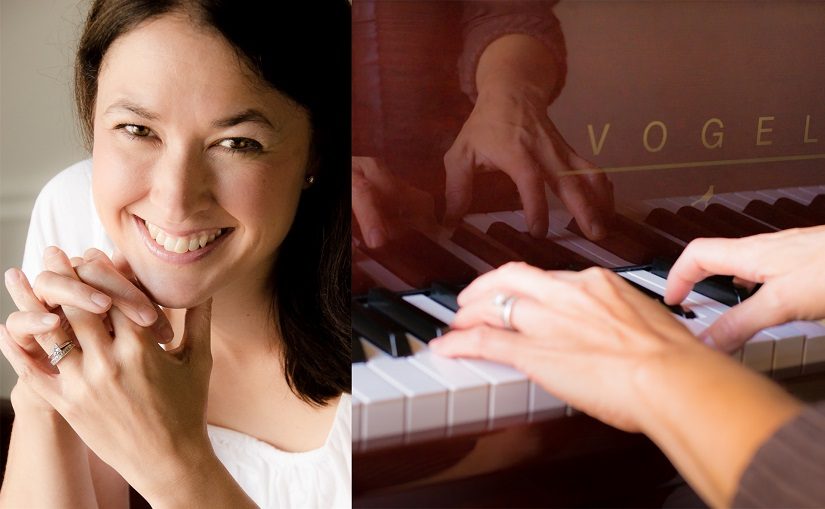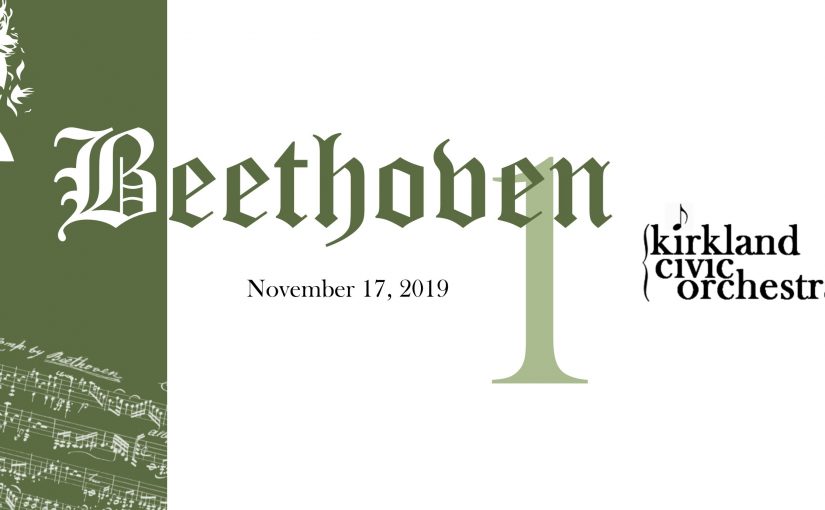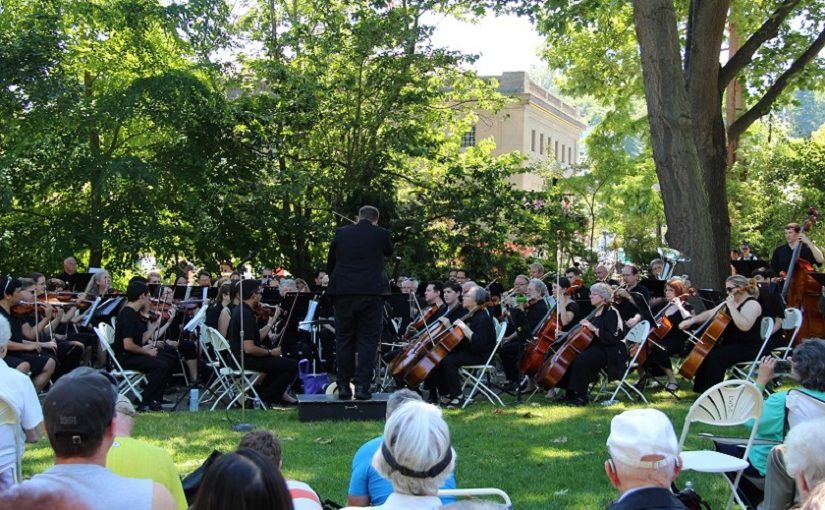Cori Belle will play the Mendelssohn #2 at our next performance. She is a musician and a mom. We discussed her playing, her upcoming performance, and some thoughts on her social media presence.
- When did you start playing music and did you start with the piano?
- When did you know you wanted to head towards a life of music?
- What’s your connection to the Kirkland Orchestra?
- Why did you choose Mendelssohn #2, or how did that happen?
- What is the connection to Beethoven?
- Could you talk a little about the role of social media for you as a performer?
KCO: When did you start playing music and did you start with the piano?
Cori: I did start with the piano. My parents both play. My dad started studying with a professor at the university while in high school. He was then able to continue studying with the same person after he graduated from high school – kind of under the table. My dad got a very good music education in college without having to major in it. My mom was a church musician as well as a piano teacher. She was my first teacher and that lasted about maybe a year.
KCO: Was that around here?
Cori: No, we lived in Oregon at the time. As is common with moms and daughters, that didn’t last very long (laughter) and so she traded me off to her friend, another piano teacher. And her friend taught me, and my mom taught her friend’s kids piano. This was a great solution for both moms.
Cori:. My mom tells me I learned by ear first, and she taught me some chords to go with melodies.
KCO: And this is what age?
Cori: I don’t know. Before school, maybe 5. Then formal lessons around first grade. Those continued forever. I went through a variety of teachers.
We moved to Arizona when I was in fifth grade. In junior high, I had my music teacher from school teaching me. That wasn’t real challenging. I wasn’t practicing. I was sight reading through my lessons and then leaving it. My mom called Arizona State University and asked for a recommendation for a teacher and that led me to Barbara Stoutenburgh, who’s still teaching. She prepared me for college.
She created a program that is now part of the Arizona Music Teachers Association. It’s a standard piano curriculum with a theory background and performance opportunities. It was amazing. I never had a teacher like her. She really got me on track.
You asked me if I played other instruments. No, it was always piano. I wanted to specialize. I think it takes a lifetime to really learn an instrument, especially with piano.
KCO: If you end up playing the viola or the bassoon, it’s not usually where you start.
Cori: Sure. I had opportunities to dabble with harpsichord or even organ and those, they’re completely different instruments. They have the same keyboard, but a different technique and a different literature. There’s so much music for piano, that’s what I studied for.
KCO: When did you know you wanted to head towards a life of music? Would you call yourself a professional musician?
Cori: I have a hard time with that term (laughter).
KCO: I do too, actually, so let’s say when you decided to become more serious.
Cori: My sophomore year of high school I got involved in choir. It was actually because I liked a boy who was in the top chamber group, and he introduced me to the choir teacher and said, “you’ve got to go play for her,” so I went and played. She said, “you’re hired!” It happened during my prep period. I had it free, so I went and played for the top chamber group every day at school for a year and that morphed into the next three years of playing for as many choirs as I could at the school, and playing for all their school musicals, sitting in their pit orchestra.
Our district was really arts centric, and they offered a concerto competition at one point. I applied and won and got to play with members of the Phoenix symphony, a Mozart piano concerto.
Choir got me hooked. I just loved accompanying. I loved the challenge of it. I loved the repertoire we did. We did Rutter’s Gloria. We did major works.
KCO: One of the things you get when you’re an accompanist, which I think is also a little different from a piano soloist, is you get to play with other people. It’s a way to be social, but also a different musical setting. I’ve done some singing, and I’ve played solo literature with piano accompanist. It’s a different mentality to be an accompanist. When you’re in music school, finding your accompanist is a big deal, so that’s cool. I can see how that would hook you.
Cori: Yeah, so that’s when I decided, maybe junior year, I was talking to my piano teacher and found out, oh this could actually be a living. I could be an accompanist and get paid for it. And I did get paid for it in high school, so I guess you could say I’ve been professional since then (laughter), if that’s your definition.
KCO: Was it the success as an accompanist that gave you the of external validation? That insight you get when someone else says you are capable of doing this. Was that the moment?
Cori: I think I got that validation from my peers, too. All of a sudden, I had this group of people that loved me and loved music, you know? We loved that same thing. Getting paid was sort of a bonus. It wasn’t something I was looking for.
I majored in piano performance, not in accompanying. I thought I wanted to do accompanying, but the professor I ended up studying with suggested I study piano performance. You’ll get all the technique and you’ll learn the literature, and then you can still do accompanying on the side.
You can still learn the languages and play for singers and do all that, but it’s harder to go the other way, just studying the accompanying. You don’t always—and it might have changed, this was twenty years ago—but you don’t always get the best professor. You don’t always get the same focus on solo literature because you just don’t have time. When they know you have the skill that they need, you go to college and other students find out you’re an accompanist: every singer needs an accompanist. All the instrumentalists need an accompanist. The choirs need an accompanist. That can completely consume your time.
KCO: Right! Where was this?
Cori: I was at Grand Canyon University in Arizona. At the time it was a huge, great music department and it’s since changed. I don’t think it has as much of a classical focus now. It has more of a worship production focus. The students will write, perform, and record their own CDs on campus and Christian worship music. There’s still a choir. They’re still doing some classical. I’ve noticed some of my professors coming back after hiatus, so I’m hopeful that it comes back. It was such a rich place for me to learn.
KCO: What’s your connection to the Kirkland Orchestra? How did you get involved with that?
Cori: I had played for Kirkland Choral Society for the last four years, and Kathy Truer is one of the singers. Jim comes to all the concerts and after one concert, about a year or two ago, he came up to me and asked if I would be interested in playing a concerto someday. I said sure.
Then life happened, and so a year or two later, we got back together, and he said, “do you want to do this this season? Are you ready? Let’s sit down and talk.” So we did!.
Kathy, she talks about the orchestra all the time, all the soloists and everything.
KCO: That is fantastic. Why did you choose Mendelssohn #2, or how did that happen?
Cori: Jim and I sat down, and I knew he wanted to do Beethoven focus this year, so we talked about the Beethoven fourth. We also talked about the Schumann A minor piano concerto, which I love. And then the Mendelssohn, and so time constraints were part of the conversation. What would fit well within a good program for the orchestra, and the connection to Beethoven. Jim wanted to make sure it was there, and the size of the orchestra, just making it fit.
KCO: What is the connection to Beethoven?
Cori: I don’t know what Jim would say (laughter). The one that I found is, they both use this three-note pattern, and Beethoven goes down a minor third for a symphony. Mendelssohn brings it up and it’s a completely lighthearted, different feel. But he plays with that same motif of notes.
KCO: With the Mendelssohn, my impression is that it is really technical, which surprised me. What are your impressions of the Mendelssohn? To me, even though it’s romantic, it has a lot of classical elements and a focus on scale play.
Cori: Mendelssohn in general, he did all the Songs without Words. He did a lot for voice and piano. His sister did a lot for voice and piano, so those soaring melodies are really what drew me first. This is a piece that I studied in college. I studied both the Mendelssohn concertos, 1 and 2. I like fast finger work. I like the challenge of that. It’s fun; it’s exciting.
KCO: Oh, one hundred percent! I think it’s a sort of trapeze act when I listen to it.
Cori: I read something this morning: Robert Schumann looked at the score, the Mendelssohn second, and didn’t think there was anything for virtuoso pianists to play. He thought this has all been done. It is not challenging. It is not impressive. Even Mendelssohn wasn’t really happy with what he did. I even had a fellow pianist comment to me, “oh that’s such a cute concerto,” and as I’ve been working with it even more, I think there is nothing cute about this, it’s really difficult (laughter).
KCO: What else appeals to you?
Cori: He trades the melody between hands so while you’re doing the sixteenth notes, continuously, you’re also supposed to bring out those quarter note melody that alternates between the hands. Creating the balance between those is another trick. In the end, it is a challenge to make it all sound easy, and effortless. It’s easy to play fast notes, but to play them and carry along the melody, and make it seem like it’s no effort at all, is really difficult.
I don’t know if you knew, he wrote it on his honeymoon. I feel like that’s present in there, and that’s where I get the emotional cues. I think sometimes he’s in conversation with his wife. I think there’s a male voice sometimes and a female voice sometimes.
The whole second movement I feel like is a love story between the two of them, so tender. And then the last one, somebody called fireworks. I think it’s just part of the ecstasy of new love and you’re on your honeymoon and everything’s rosy and the future is bright. I don’t know, I guess I’m a hopeless romantic in that.
But you’re right, he stays with the classical form. It’s like a sonata allegro form. He doesn’t have the angst of Beethoven or of Schubert. In fact, he died when he was 38, I think. He had a young life, but it wasn’t fraught. He didn’t deal with deafness, or syphilis like Schubert, or death. Mendelssohn seems like sort of steady, not a lot of drama. Maybe that’s why some don’t think of him as one of the major players.
KCO: Could you talk a little about the role of social media for you as a performer?
KCO: I was on your website, and I love the aesthetic. What are you thinking about your IndieMusikhaus? How does that relate to what you might want to tell people about for in the future?
Cori: I guess first and foremost, which we haven’t even talked about, I’m a mom. I have my three girls and super involved with school and their gymnastics and dance. Everything else has to kind of be periphery so even though I don’t have a full-time job where I get paid, I’m a full-time mom. That needs to be my focus and so playing for the choir is a part of my life. Indie Musikhaus is the series of house concerts that I started seven-eight years ago as a way to bring music into our home and not impact the family too much negatively. So instead of going out and playing all these concerts, I wanted to bring my friends in, and also have a chance to play.
KCO: They are in your home?
Cori: Yes, in my home. My vision is bigger, eventually I’d like it to be a circuit where Indie Musikhaus is sort of the name and the programming, but then we perform in different places. Maybe it’s not just homes, maybe it’s also retirement centers or libraries or schools. But it was a way to sort of marry my priority as a homemaker and mom with my love of music.
It’s been phenomenal. I guess the website actually started out as a personal blog of being a mom for the first time. It has morphed. I don’t want to talk so much about my kids because I want to protect their privacy. It is really music focused now. It’s become a website, https://coribelle.com/.
A couple years ago my kids started in school full time and so I decided, hey, I want to make this classical CD that I’ve been dreaming about forever. So that was the focus of my first year without my kids at home during the day. A friend of mine helped me outfit my living room with a couple of microphones and I recorded at home when they were at school. When airplanes had passed and the garbage truck, you know, it was really interesting. Some of the social media stuff has happened because I want to promote my CD. That’s on the website. That was the impetus in creating a professional Facebook page. I don’t do much beyond that. I’m not on Instagram or Twitter, it’s too much, as it is, to manage what I’ve got.
KCO: Did you work with somebody who was knowledgeable in music to create the website?
Cori: No these are all template based, so my website is based on a template by BandZoogle. Their focus is more like Indie rock bands and country music. They have such cool templates. I thought, “Why don’t I just use it for classical music and see how it turns out.”
And they update it. The neat thing with them is your content always stays the same, but you can change your template and you have a whole new look. You don’t have to recreate any of your text or images, they’re all saved. And same with Indie Musikhaus, that’s a Wix site. It’s very basic. Yeah, I’m all self-taught, figuring it out as I go.
And so, the only thing I would add is I am hoping to do more chamber music in the future. I’ve started talking to another violinist in the area and she wants to do a concert. We’ll probably start out in the Indie Musikhaus. That’s one thing I haven’t delved into very deeply. I’m really familiar with choral works and with a lot of voice arias and art song. but chamber music is next. Let’s see what this has to offer.
KCO: Thanks for talking to us.
Thanks to Cori for the Interview on October 29, 2019.
by Francis X. Langlois – tuba player in the KCO
